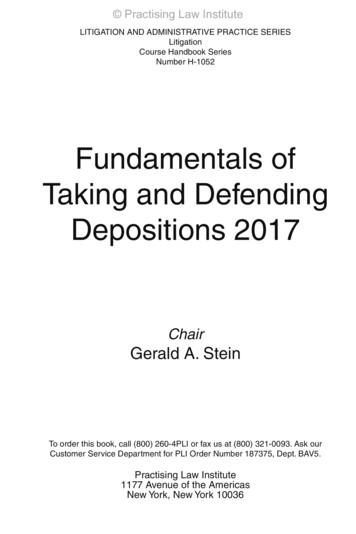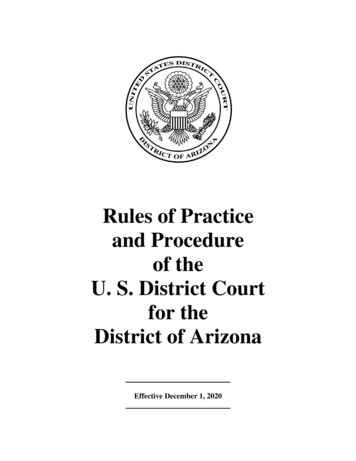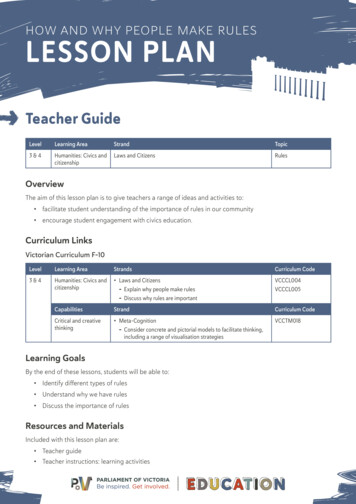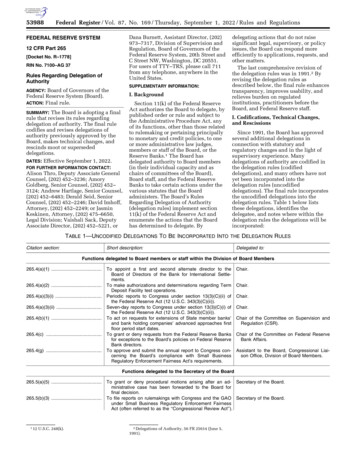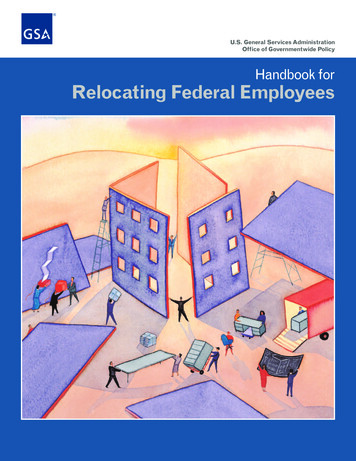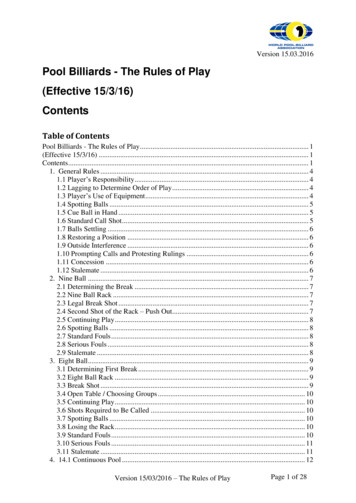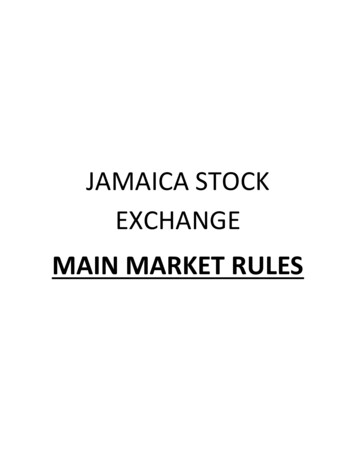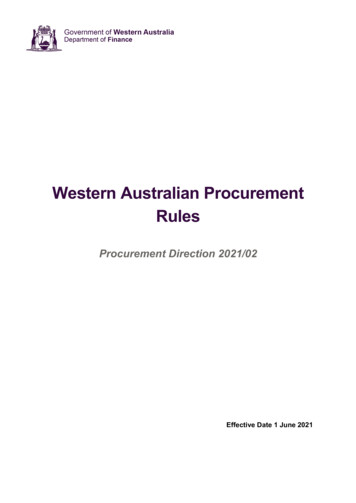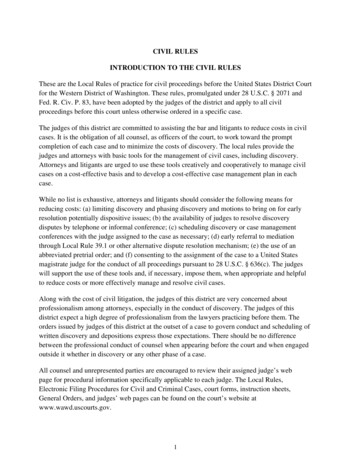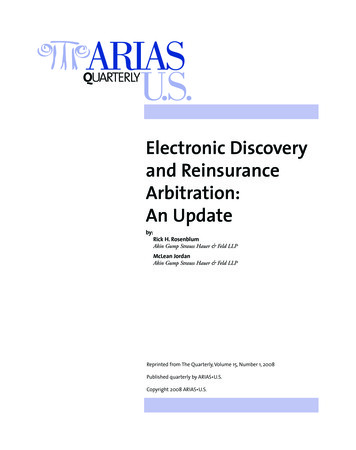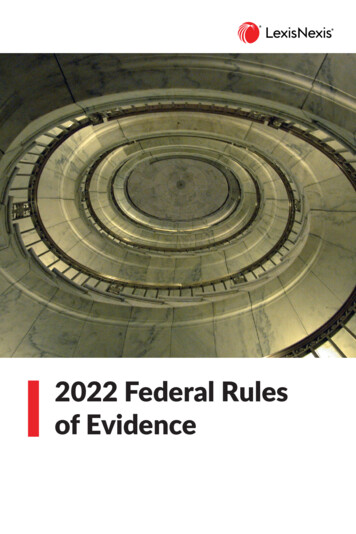
Transcription
2022 Federal Rulesof Evidence
Compliments ofFEDERAL RULES OF EVIDENCEIGENERAL PROVISIONSRule 101Rule 102Rule 103Rule 104Rule 105Scope; DefinitionsPurposeRulings on EvidencePreliminary QuestionsLimiting Evidence That Is Not AdmissibleAgainst Other Parties or for Other PurposesRemainder of or Related Writings or RecordedStatementsRule 106IIJUDICIAL NOTICERule 201Judicial Notice of Adjudicative FactsIIIPRESUMPTIONS IN CIVIL ACTIONSRule 301Rule 302Presumptions in a Civil Case GenerallyApplying State Law to Presumptions in Civil CasesIVRELEVANCE AND ITS LIMITSRule 401Rule 402Rule 403Test for Relevant EvidenceGeneral Admissibility of Relevant EvidenceExcluding Relevant Evidence for Prejudice, Confusion,Waste of Time, or Other ReasonsCharacter Evidence; Other Crimes, Wrongs or ActsMethods of Proving CharacterHabit; Routine PracticeSubsequent Remedial MeasuresCompromise Offers and NegotiationsRule 404Rule 405Rule 406Rule 407Rule 4081456
2022 Federal Rules of EvidenceRule 409Rule 410Rule 411Rule 412Rule 413Rule 414Rule 415Offers to Pay Medical and Similar ExpensesPleas, Plea Discussions, and Related StatementsLiability InsuranceSex-Offense Cases: The Victim’s Sexual Behavioror PredispositionSimilar Crimes in Sexual-Assault CasesSimilar Crimes in Child-Molestation CasesSimilar Acts in Civil Cases Involving Sexual Assault orChild Molestation16VPRIVILEGESRule 501Rule 502Privilege in GeneralAttorney-Client Privilege and Work Product;Limitations on WaiverVIWITNESSESRule 601Rule 602Rule 603Rule 604Rule 605Rule 606Rule 607Rule 608Rule 609Rule 610Rule 611Competency to Testify in GeneralNeed for Personal KnowledgeOath or Affirmation to Testify TruthfullyInterpreterJudge’s Competency as a WitnessJuror’s Competency as a WitnessWho May Impeach a WitnessA Witness’s Character for Truthfulness or UntruthfulnessImpeachment by Evidence of a Criminal ConvictionReligious Beliefs or OpinionsMode and Order of Examining Witnesses andPresenting EvidenceWriting Used to Refresh a Witness’s MemoryRule 61219
Compliments ofRule 613Rule 614Rule 615Witness’s Prior StatementCourt’s Calling or Examining a WitnessExcluding WitnessesVIIOPINIONS AND EXPERT TESTIMONYRule 701Rule 702Rule 703Rule 704Rule 705Rule 706Opinion Testimony by Lay WitnessesTestimony by Expert WitnessesBases of an Expert’s Opinion TestimonyOpinion on an Ultimate IssueDisclosing the Facts or Data Underlying anExpert’s OpinionCourt-Appointed Expert WitnessesVIIIHEARSAYRule 801Definitions That Apply to This Article; Exclusionsfrom HearsayThe Rule Against HearsayExceptions to the Rule Against Hearsay—Regardlessof Whether the Declarant is Available as a WitnessExceptions to the Rule Against Hearsay—When theDeclarant is Unavailable as a WitnessHearsay Within HearsayAttacking and Supporting the Declarant’s CredibilityResidual ExceptionRule 802Rule 803Rule 804Rule 805Rule 806Rule 807IXAUTHENTICATION AND IDENTIFICATIONRule 901Rule 902Rule 903Authenticating or Identifying EvidenceEvidence That Is Self-AuthenticatingSubscribing Witness’s Testimony272943
2022 Federal Rules of EvidenceXCONTENTS OF WRITINGS,RECORDINGS, AND PHOTOGRAPHSRule 1001Rule 1002Rule 1003Rule 1004Rule 1005Rule 1006Rule 1007Definitions That Apply to This ArticleRequirement of the OriginalAdmissibility of DuplicatesAdmissibility of Other Evidence of ContentCopies of Public Records to Prove ContentSummaries to Prove ContentTestimony or Statement of a Party toProve ContentFunctions of the Court and JuryRule 1008XIMISCELLANEOUS RULESRule 1101Rule 1102Rule 1103Applicability of the RulesAmendmentsTitle4952
Compliments ofFEDERAL RULES OF EVIDENCEARTICLE I. GENERAL PROVISIONSRule 101. Scope; Definitions(a) Scope. These rules apply to proceedings in United Statescourts. The specific courts and proceedings to which therules apply, along with exceptions, are set out in Rule 1101.(b) Definitions. In these rules:(1)(2)(3)(4)(5)(6)“civil case” means a civil action or proceeding;“criminal case” includes a criminal proceeding;“public office” includes a public agency;“record” includes a memorandum, report, or datacompilation;a “rule prescribed by the Supreme Court” means a ruleadopted by the Supreme Court under statutoryauthority; anda reference to any kind of written material or anyother medium includes electronically storedinformation.Rule 102. PurposeThese rules should be construed so as to administer everyproceeding fairly, eliminate unjustifiable expense and delay,and promote the development of evidence law, to the end ofascertaining the truth and securing a just determination.1
2022 Federal Rules of EvidenceRule 103. Rulings on Evidence(a) Preserving a Claim of Error. A party may claim error in aruling to admit or exclude evidence only if the error affectsa substantial right of the party and:(1)if the ruling admits evidence, a party, on the record:(A) timely objects or moves to strike; and(B) states the specific ground, unless it was apparentfrom the context; or(2) if the ruling excludes evidence, a party informs thecourt of its substance by an offer of proof, unless thesubstance was apparent from the context.(b) Not Needing to Renew an Objection or Offer of Proof.Once the court rules definitively on the record — eitherbefore or at trial — a party need not renew an objection oroffer of proof to preserve a claim of error for appeal.(c) Court’s Statement About the Ruling; Directing an Offer ofProof. The court may make any statement about thecharacter or form of the evidence, the objection made, andthe ruling. The court may direct that an offer of proof bemade in question-and-answer form.(d) Preventing the Jury from Hearing Inadmissible Evidence.To the extent practicable, the court must conduct a jury trialso that inadmissible evidence is not suggested to the jury byany means.(e) Taking Notice of Plain Error. A court may take notice of aplain error affecting a substantial right, even if the claim oferror was not properly preserved.2
Compliments ofRule 104. Preliminary Questions(a) In General. The court must decide any preliminary questionabout whether a witness is qualified, a privilege exists, orevidence is admissible. In so deciding, the court is not boundby evidence rules, except those on privilege.(b) Relevance That Depends on a Fact. When the relevance ofevidence depends on whether a fact exists, proof must beintroduced sufficient to support a finding that the fact doesexist. The court may admit the proposed evidence on thecondition that the proof be introduced later.(c) Conducting a Hearing So That the Jury Cannot Hear It.The court must conduct any hearing on a preliminaryquestion so that the jury cannot hear it if:(1)(2)the hearing involves the admissibility of a confession;a defendant in a criminal case is a witness and sorequests; or(3) justice so requires.(d) Cross-Examining a Defendant in a Criminal Case. Bytestifying on a preliminary question, a defendant in acriminal case does not become subject to cross-examinationon other issues in the case.(e) Evidence Relevant to Weight and Credibility. This ruledoes not limit a party’s right to introduce before the juryevidence that is relevant to the weight or credibility ofother evidence.3
2022 Federal Rules of EvidenceRule 105. Limiting Evidence That Is Not AdmissibleAgainst Other Parties or for Other PurposesIf the court admits evidence that is admissible against aparty or for a purpose — but not against another party orfor another purpose — the court, on timely request, mustrestrict the evidence to its proper scope and instruct thejury accordingly.Rule 106. Remainder of or Related Writings orRecorded StatementsIf a party introduces all or part of a writing or recordedstatement, an adverse party may require the introduction,at that time, of any other part — or any other writing orrecorded statement — that in fairness ought to beconsidered at the same time.ARTICLE II. JUDICIAL NOTICERule 201. Judicial Notice of Adjudicative Facts(a) Scope. This rule governs judicial notice of an adjudicativefact only, not a legislative fact.(b) Kinds of Facts That May Be Judicially Noticed. The courtmay judicially notice a fact that is not subject to reasonabledispute because it:(1)(2)4is generally known within the trial court’s territorialjurisdiction; orcan be accurately and readily determined from sourceswhose accuracy cannot reasonably be questioned.
Compliments of(c) Taking Notice. The court:(1)(2)may take judicial notice on its own; ormust take judicial notice if a party requests it and thecourt is supplied with the necessary information.(d) Timing. The court may take judicial notice at any stage ofthe proceeding.(e) Opportunity to Be Heard. On timely request, a party isentitled to be heard on the propriety of taking judicialnotice and the nature of the fact to be noticed. If the courttakes judicial notice before notifying a party, the party, onrequest, is still entitled to be heard.(f) Instructing the Jury. In a civil case, the court must instructthe jury to accept the noticed fact as conclusive. In acriminal case, the court must instruct the jury that it may ormay not accept the noticed fact as conclusive.ARTICLE III. PRESUMPTIONS IN CIVIL CASESRule 301. Presumptions in Civil Cases GenerallyIn a civil case, unless a federal statute or these rules provideotherwise, the party against whom a presumption isdirected has the burden of producing evidence to rebut thepresumption. But this rule does not shift the burden ofpersuasion, which remains on the party who had it originally.5
2022 Federal Rules of EvidenceRule 302. Applying State Law to Presumptions inCivil CasesIn a civil case, state law governs the effect of a presumptionregarding a claim or defense for which state law suppliesthe rule of decision.ARTICLE IV. RELEVANCE AND ITS LIMITSRule 401. Test for Relevant EvidenceEvidence is relevant if:(a) it has any tendency to make a fact more or less probablethan it would be without the evidence; and(b) the fact is of consequence in determining the action.Rule 402. General Admissibility of Relevant EvidenceRelevant evidence is admissible unless any of the followingprovides otherwise: the United States Constitution;a federal statute;these rules; orother rules prescribed by the Supreme Court.Irrelevant evidence is not admissible.6
Compliments ofRule 403. Excluding Relevant Evidence for Prejudice,Confusion, Waste of Time, or Other ReasonsThe court may exclude relevant evidence if its probativevalue is substantially outweighed by a danger of one ormore of the following: unfair prejudice, confusing the issues,misleading the jury, undue delay, wasting time, or needlesslypresenting cumulative evidence.Rule 404. Character Evidence; Other Crimes, Wrongs orActs(a) Character Evidence.(1)Prohibited Uses. Evidence of a person’s character orcharacter trait is not admissible to prove that on aparticular occasion the person acted in accordancewith the character or trait.(2) Exceptions for a Defendant or Victim in a CriminalCase. The following exceptions apply in a criminal case:(A) a defendant may offer evidence of the defendant’spertinent trait, and if the evidence is admitted, theprosecutor may offer evidence to rebut it;(B) subject to the limitations in Rule 412, a defendantmay offer evidence of an alleged victim’s pertinenttrait, and if the evidence is admitted, theprosecutor may:(i) offer evidence to rebut it; and(ii) offer evidence of the defendant’s sametrait; and7
2022 Federal Rules of Evidence(C) in a homicide case, the prosecutor may offerevidence of the alleged victim’s trait ofpeacefulness to rebut evidence that the victimwas the first aggressor.(3) Exceptions for a Witness. Evidence of a witness’scharacter may be admitted under Rules 607, 608,and 609.(b) Other Crimes, Wrongs, or Acts.(1)Prohibited Uses. Evidence of any other crime, wrong,or act is not admissible to prove a person’s characterin order to show that on a particular occasion theperson acted in accordance with the character.(2) Permitted Uses. This evidence may be admissible foranother purpose, such as proving motive, opportunity,intent, preparation, plan, knowledge, identity, absenceof mistake, or lack of accident.(3) Notice in a Criminal Case. In a criminal case, theprosecutor must:(A) provide reasonable notice of any such evidencethat the prosecutor intends to offer at trial, sothat the defendant has a fair opportunity to meetit;(B) articulate in the notice the permitted purpose forwhich the prosecutor intends to offer the evidenceand the reasoning that supports the purpose; and(C) do so in writing before trial—or in any form duringtrial if the court, for good cause, excuses lack ofpretrial notice.8
2022 Federal Rules of EvidenceRule 405. Methods of Proving Character(a) By Reputation or Opinion. When evidence of a person’scharacter or character trait is admissible, it may be provedby testimony about the person’s reputation or by testimonyin the form of an opinion. On cross-examination of thecharacter witness, the court may allow an inquiry intorelevant specific instances of the person’s conduct.(b) By Specific Instances of Conduct. When a person’scharacter or character trait is an essential element ofa charge, claim, or defense, the character or trait mayalso be proved by relevant specific instances of theperson’s conduct.Rule 406. Habit; Routine PracticeEvidence of a person’s habit or an organization’s routinepractice may be admitted to prove that on a particularoccasion the person or organization acted in accordancewith the habit or routine practice. The court may admit thisevidence regardless of whether it is corroborated orwhether there was an eyewitness.Rule 407. Subsequent Remedial MeasuresWhen measures are taken that would have made an earlierinjury or harm less likely to occur, evidence of thesubsequent measures is not admissible to prove: 9negligence;culpable conduct;a defect in a product or its design; ora need for a warning or instruction.
Compliments ofBut the court may admit this evidence for another purpose,such as impeachment or — if disputed — proving ownership,control, or the feasibility of precautionary measures.Rule 408. Compromise Offers and Negotiations(a) Prohibited Uses. Evidence of the following is not admissible— on behalf of any party — either to prove or disprove thevalidity or amount of a disputed claim or to impeach by aprior inconsistent statement or a contradiction:(1)furnishing, promising, or offering — or accepting,promising to accept, or offering to accept — a valuableconsideration in compromising or attempting tocompromise the claim; and(2) conduct or a statement made during compromisenegotiations about the claim — except when offered ina criminal case and when the negotiations related to aclaim by a public office in the exercise of its regulatory,investigative, or enforcement authority.(b) Exceptions. The court may admit this evidence for anotherpurpose, such as proving a witness’s bias or prejudice,negating a contention of undue delay, or proving an effortto obstruct a criminal investigation or prosecution.Rule 409. Offers to Pay Medical and Similar ExpensesEvidence of furnishing, promising to pay, or offering to paymedical, hospital, or similar expenses resulting from aninjury is not admissible to prove liability for the injury.10
2022 Federal Rules of EvidenceRule 410. Pleas, Plea Discussions, and Related Statements(a) Prohibited Uses. In a civil or criminal case, evidence of thefollowing is not admissible against the defendant who madethe plea or participated in the plea discussions:(1)(2)(3)a guilty plea that was later withdrawn;a nolo contendere plea;a statement made during a proceeding on either ofthose pleas under Federal Rule of Criminal Procedure11 or a comparable state procedure; or(4) a statement made during plea discussions with anattorney for the prosecuting authority if thediscussions did not result in a guilty plea or theyresulted in a later withdrawn guilty plea.(b) Exceptions. The court may admit a statement described inRule 410(a)(3) or (4):(1)(2)in any proceeding in which another statement madeduring the same plea or plea discussions has beenintroduced, if in fairness the statements ought to beconsidered together; orin a criminal proceeding for perjury or false statement,if the defendant made the statement under oath, onthe record, and with counsel present.Rule 411. Liability InsuranceEvidence that a person was or was not insured againstliability is not admissible to prove whether the person actednegligently or otherwise wrongfully. But the court mayadmit this evidence for another purpose, such as proving a11
Compliments ofwitness’s bias or prejudice or proving agency, ownership,or control.Rule 412. Sex-Offense Cases: The Victim’s SexualBehavior or Predisposition(a) Prohibited Uses. The following evidence is not admissiblein a civil or criminal proceeding involving alleged sexualmisconduct:(1)evidence offered to prove that a victim engaged inother sexual behavior; or(2) evidence offered to prove a victim’s sexualpredisposition.(b) Exceptions.(1)Criminal Cases. The court may admit the followingevidence in a criminal case:(A) evidence of specific instances of a victim’s sexualbehavior, if offered to prove that someone otherthan the defendant was the source of semen,injury, or other physical evidence;(B) evidence of specific instances of a victim’s sexualbehavior with respect to the person accused ofthe sexual misconduct, if offered by the defendantto prove consent or if offered by the prosecutor;and(C) evidence whose exclusion would violate thedefendant’s constitutional rights.(2) Civil Cases. In a civil case, the court may admitevidence offered to prove a victim’s sexual behavior orsexual predisposition if its probative value substantially12
2022 Federal Rules of Evidenceoutweighs the danger of harm to any victim and ofunfair prejudice to any party. The court may admitevidence of a victim’s reputation only if the victim hasplaced it in controversy.(c) Procedure to Determine Admissibility.(1)Motion. If a party intends to offer evidence under Rule412(b), the party must:(A) file a motion that specifically describes theevidence and states the purpose for which it is tobe offered;(B) do so at least 14 days before trial unless the court,for good cause, sets a different time;(C) serve the motion on all parties; and(D) notify the victim or, when appropriate, the victim’sguardian or representative.(2) Hearing. Before admitting evidence under this rule,the court must conduct an in camera hearing and givethe victim and parties a right to attend and be heard.Unless the court orders otherwise, the motion, relatedmaterials, and the record of the hearing must be andremain sealed.(d) Definition of “Victim.” In this rule, “victim” includes analleged victim.Rule 413. Similar Crimes in Sexual-Assault Cases(a) Permitted Uses. In a criminal case in which a defendant isaccused of a sexual assault, the court may admit evidencethat the defendant committed any other sexual assault.The evidence may be considered on any matter to whichit is relevant.13
Compliments of(b) Disclosure to the Defendant. If the prosecutor intends tooffer this evidence, the prosecutor must disclose it to thedefendant, including witnesses’ statements or a summary ofthe expected testimony. The prosecutor must do so at least15 days before trial or at a later time that the court allowsfor good cause.(c) Effect on Other Rules. This rule does not limit the admissionor consideration of evidence under any other rule.(d) Definition of “Sexual Assault.” In this rule and Rule 415,“sexual assault” means a crime under federal law or understate law (as “state” is defined in 18 U.S.C. § 513) involving:(1)(2)(3)(4)(5)any conduct prohibited by 18 U.S.C. chapter 109A;contact, without consent, between any part of thedefendant’s body — or an object — and anotherperson’s genitals or anus;contact, without consent, between the defendant’sgenitals or anus and any part of another person’s body;deriving sexual pleasure or gratification from inflictingdeath, bodily injury, or physical pain on anotherperson; oran attempt or conspiracy to engage in conductdescribed in subparagraphs (1) – (4).Rule 414. Similar Crimes in Child-Molestation Cases(a) Permitted Uses. In a criminal case in which a defendant isaccused of child molestation, the court may admit evidencethat the defendant committed any other child molestation.The evidence may be considered on any matter to whichit is relevant.14
2022 Federal Rules of Evidence(b) Disclosure to the Defendant. If the prosecutor intends tooffer this evidence, the prosecutor must disclose it to thedefendant, including witnesses’ statements or a summary ofthe expected testimony. The prosecutor must do so at least15 days before trial or at a later time that the court allowsfor good cause.(c) Effect on Other Rules. This rule does not limit theadmission or consideration of evidence under any otherrule.(d) Definition of “Child” and “Child Molestation.” In this ruleand Rule 415:(1)(2)15“child” means a person below the age of 14; and“child molestation” means a crime under federal lawor under state law (as “state” is defined in 18 U.S.C. §513) involving:(A) any conduct prohibited by 18 U.S.C. chapter 109Aand committed with a child;(B) any conduct prohibited by 18 U.S.C. chapter 110;(C) contact between any part of the defendant’s body— or an object — and a child’s genitals or anus;(D) contact between the defendant’s genitals or anusand any part of a child’s body;(E) deriving sexual pleasure or gratification frominflicting death, bodily injury, or physical pain ona child; or(F) an attempt or conspiracy to engage in conductdescribed in subparagraphs (A) – (E).
Compliments ofRule 415. Similar Acts in Civil Cases Involving SexualAssault or Child Molestation(a) Permitted Uses. In a civil case involving a claim for reliefbased on a party’s alleged sexual assault or childmolestation, the court may admit evidence that the partycommitted any other sexual assault or child molestation.The evidence may be considered as provided in Rules 413and 414.(b) Disclosure to the Opponent. If a party intends to offer thisevidence, the party must disclose it to the party againstwhom it will be offered, including witnesses’ statements or asummary of the expected testimony. The party must do soat least 15 days before trial or at a later time that the courtallows for good cause.(c) Effect on Other Rules. This rule does not limit the admissionor consideration of evidence under any other rule.ARTICLE V. PRIVILEGESRule 501. Privilege in GeneralThe common law — as interpreted by United States courtsin the light of reason and experience — governs a claim ofprivilege unless any of the following provides otherwise: the United States Constitution;a federal statute; orrules prescribed by the Supreme Court.But in a civil case, state law governs privilege regardinga claim or defense for which state law supplies the ruleof decision.16
2022 Federal Rules of EvidenceRule 502. Attorney-Client Privilege and Work Product;Limitations on WaiverThe following provisions apply, in the circumstances set out,to disclosure of a communication or information covered bythe attorney-client privilege or work-product protection.(a) Disclosure Made in a Federal Proceeding or to a FederalOffice or Agency; Scope of a Waiver. When the disclosureis made in a federal proceeding or to a federal office oragency and waives the attorney-client privilege or workproduct protection, the waiver extends to an undisclosedcommunication or information in a federal or stateproceeding only if:(1)(2)the waiver is intentional;the disclosed and undisclosed communications orinformation concern the same subject matter; and(3) they ought in fairness to be considered together.(b) Inadvertent Disclosure. When made in a federal proceedingor to a federal office or agency, the disclosure does notoperate as a waiver in a federal or state proceeding if:(1)(2)the disclosure is inadvertent;the holder of the privilege or protection tookreasonable steps to prevent disclosure; and(3) the holder promptly took reasonable steps to rectifythe error, including (if applicable) following FederalRule of Civil Procedure 26(b)(5)(B).(c) Disclosure Made in a State Proceeding. When thedisclosure is made in a state proceeding and is not thesubject of a state-court order concerning waiver, the17
Compliments ofdisclosure does not operate as a waiver in a federalproceeding if the disclosure:(1)would not be a waiver under this rule if it had beenmade in a federal proceeding; or(2) is not a waiver under the law of the state where thedisclosure occurred.(d) Controlling Effect of a Court Order. A federal court mayorder that the privilege or protection is not waived bydisclosure connected with the litigation pending before thecourt — in which event the disclosure is also not a waiver inany other federal or state proceeding.(e) Controlling Effect of a Party Agreement. An agreement onthe effect of disclosure in a federal proceeding is bindingonly on the parties to the agreement, unless it isincorporated into a court order.(f) Controlling Effect of this Rule. Notwithstanding Rules 101and 1101, this rule applies to state proceedings and tofederal court-annexed and federal court-mandatedarbitration proceedings, in the circumstances set out in therule. And notwithstanding Rule 501, this rule applies even ifstate law provides the rule of decision.(g) Definitions. In this rule:(1)(2)“attorney-client privilege” means the protection thatapplicable law provides for confidential attorney-clientcommunications; and“work-product protection” means the protection thatapplicable law provides for tangible material (or itsintangible equivalent) prepared in anticipation oflitigation or for trial.18
2022 Federal Rules of EvidenceARTICLE VI. WITNESSESRule 601. Competency to Testify in GeneralEvery person is competent to be a witness unless theserules provide otherwise. But in a civil case, state lawgoverns the witness’s competency regarding a claim ordefense for which state law supplies the rule of decision.Rule 602. Need for Personal KnowledgeA witness may testify to a matter only if evidence isintroduced sufficient to support a finding that the witnesshas personal knowledge of the matter. Evidence to provepersonal knowledge may consist of the witness’s owntestimony. This rule does not apply to a witness’s experttestimony under Rule 703.Rule 603. Oath or Affirmation to Testify TruthfullyBefore testifying, a witness must give an oath or affirmationto testify truthfully. It must be in a form designed to impressthat duty on the witness’s conscience.Rule 604. InterpreterAn interpreter must be qualified and must give an oath oraffirmation to make a true translation.Rule 605. Judge’s Competency as a WitnessThe presiding judge may not testify as a witness at the trial.A party need not object to preserve the issue.19
Compliments ofRule 606. Juror’s Competency as a Witness(a) At the Trial. A juror may not testify as a witness before theother jurors at the trial. If a juror is called to testify, thecourt must give a party an opportunity to object outside thejury’s presence.(b) During an Inquiry into the Validity of a Verdictor Indictment.(1)Prohibited Testimony or Other Evidence. During aninquiry into the validity of a verdict or indictment, ajuror may not testify about any statement made orincident that occurred during the jury’s deliberations;the effect of anything on that juror’s or another juror’svote; or any juror’s mental processes concerning theverdict or indictment. The court may not receive ajuror’s affidavit or evidence of a juror’s statement onthese matters.(2) Exceptions. A juror may testify about whether:(A) extraneous prejudicial information was improperlybrought to the jury’s attention;(B) an outside influence was improperly brought tobear on any juror; or(C) a mistake was made in entering the verdict on theverdict form.Rule 607. Who May Impeach a WitnessAny party, including the party that called the witness, mayattack the witness’s credibility.20
2022 Federal Rules of EvidenceRule 608. A Witness’s Character for Truthfulnessor Untruthfulness(a) Reputation or Opinion Evidence. A witness’s credibilitymay be attacked or supported by testimony about thewitness’s reputation for having a character for truthfulnessor untruthfulness, or by testimony in the form of an opinionabout that character. But evidence of truthful character isadmissible only after the witness’s character fortruthfulness has been attacked.(b) Specific Instances of Conduct. Except for a criminalconviction under Rule 609, extrinsic evidence is notadmissible to prove specific instances of a witness’s conductin order to attack or support the witness’s character fortruthfulness. But the court may, on cross-examination, allowthem to be inquired into if they are probative of thecharacter for truthfulness or untruthfulness of:(1)(2)the witness; oranother witness whose character the witness beingcross-examined has testified about. By testifying onanother matter, a witness does not waive any privilegeagainst self-incrimination for testimony that relatesonly to the witness’s character for truthfulness.Rule 609. Impeachment by Evidence of a CriminalConviction(a) In General. The following rules apply to attacking awitness’s character for truthfulness by evidence of acriminal conviction:21
Compliments of(1)for a crime that, in the convicting jurisdiction, waspunishable by death or by imprisonment for morethan one year, the evidence:(A) must be admitted, subject to Rule 403, in a civilcase or in a criminal case in which the witness isnot a defendant; and(B) must be admitted in a criminal case in which thewitness is a defendant, if the probative value ofthe evidence outweighs its prejudicial effect tothat defendant; and(2) for any crime regardless of the punishment, theevidence must be admitt
2022Federal Rules of Evidence 6 Rule 302. Applying State Law to Presumptions in Civil Cases In a civil case, state law governs the effect of a presumption regarding a claim or defense for which state law supplies the rule of decision. ARTICLE IV. RELEVANCE AND ITS LIMITS Rule 401. Test for Relevant Evidence Evidence is relevant if:

